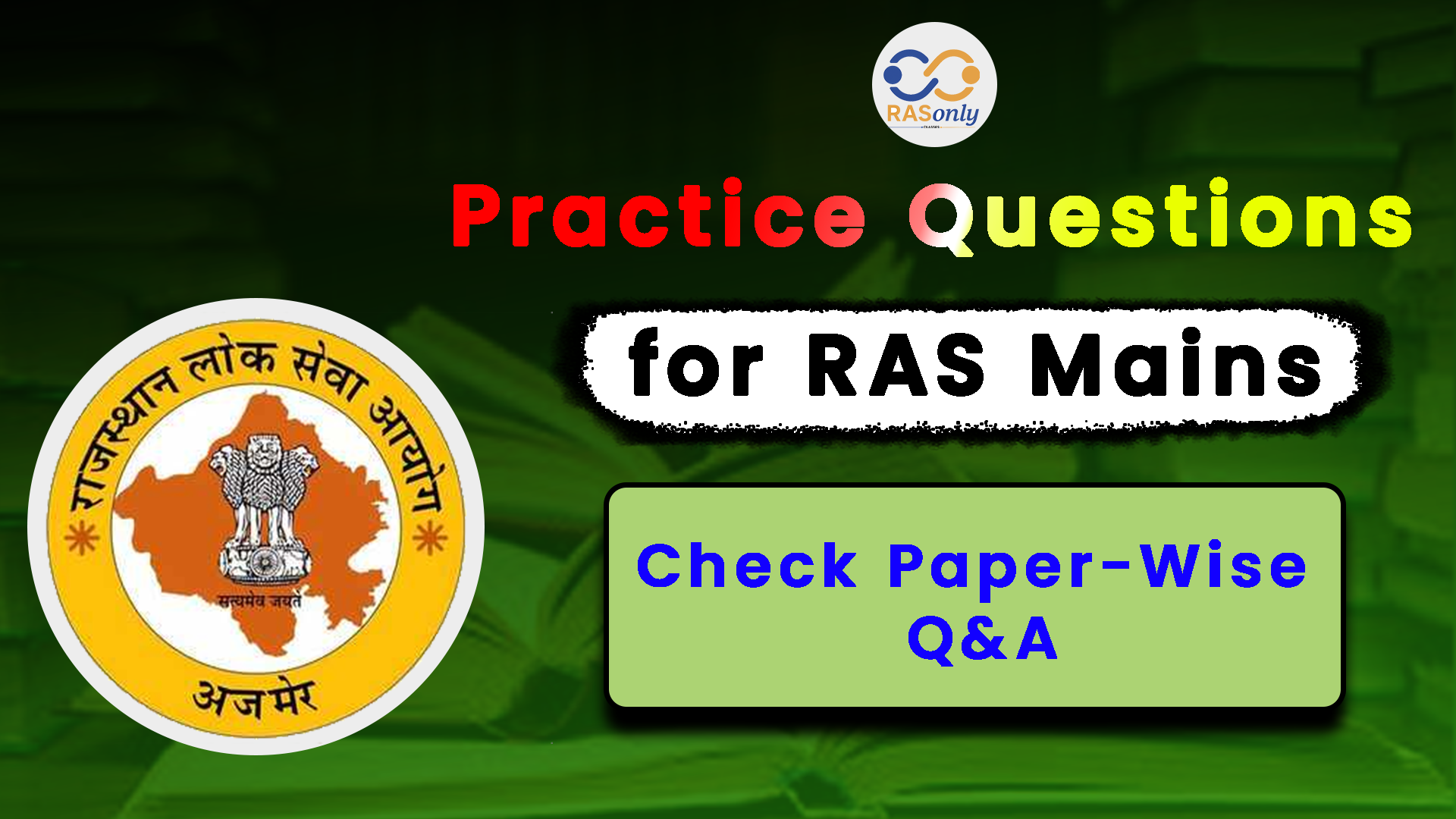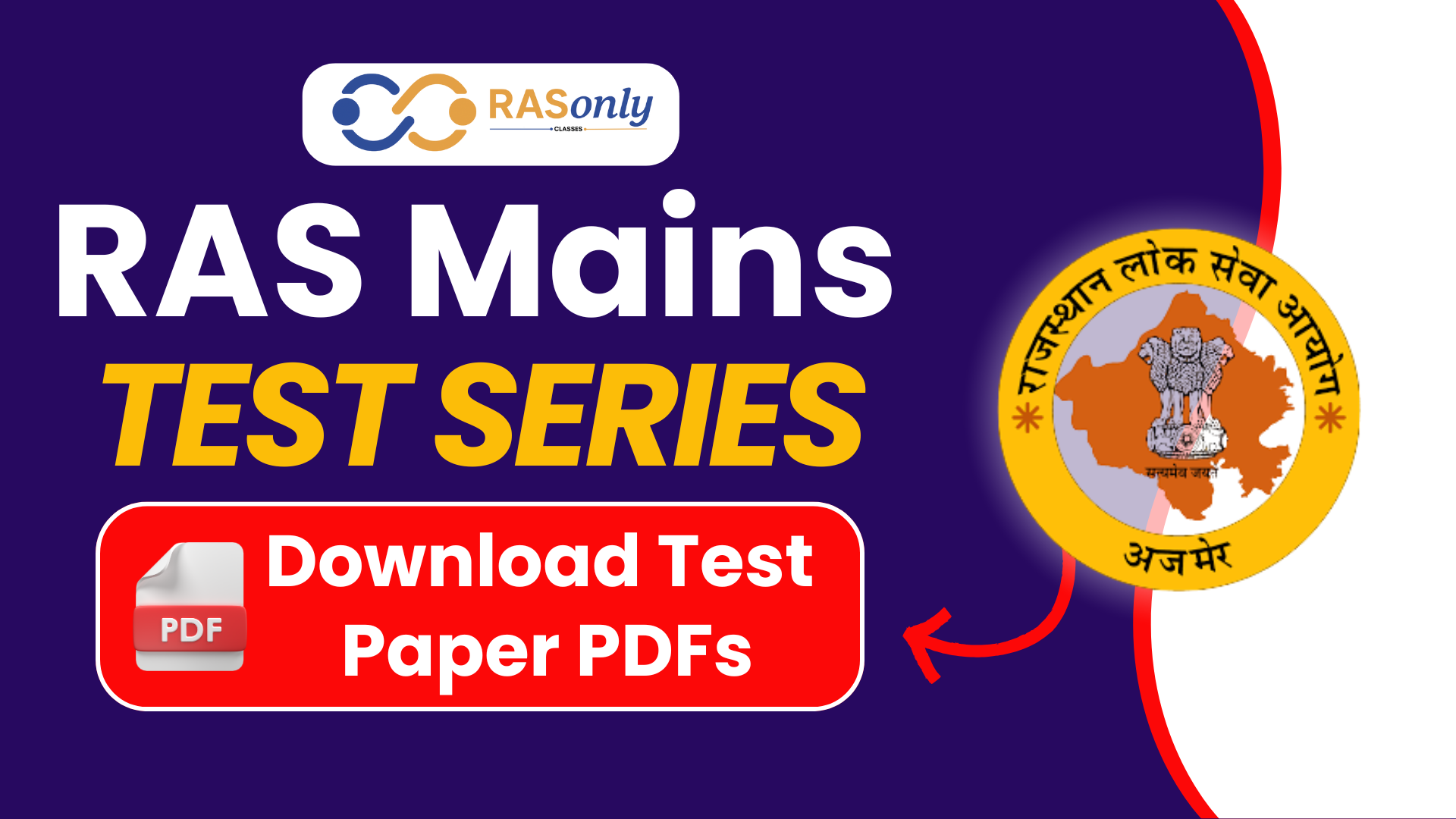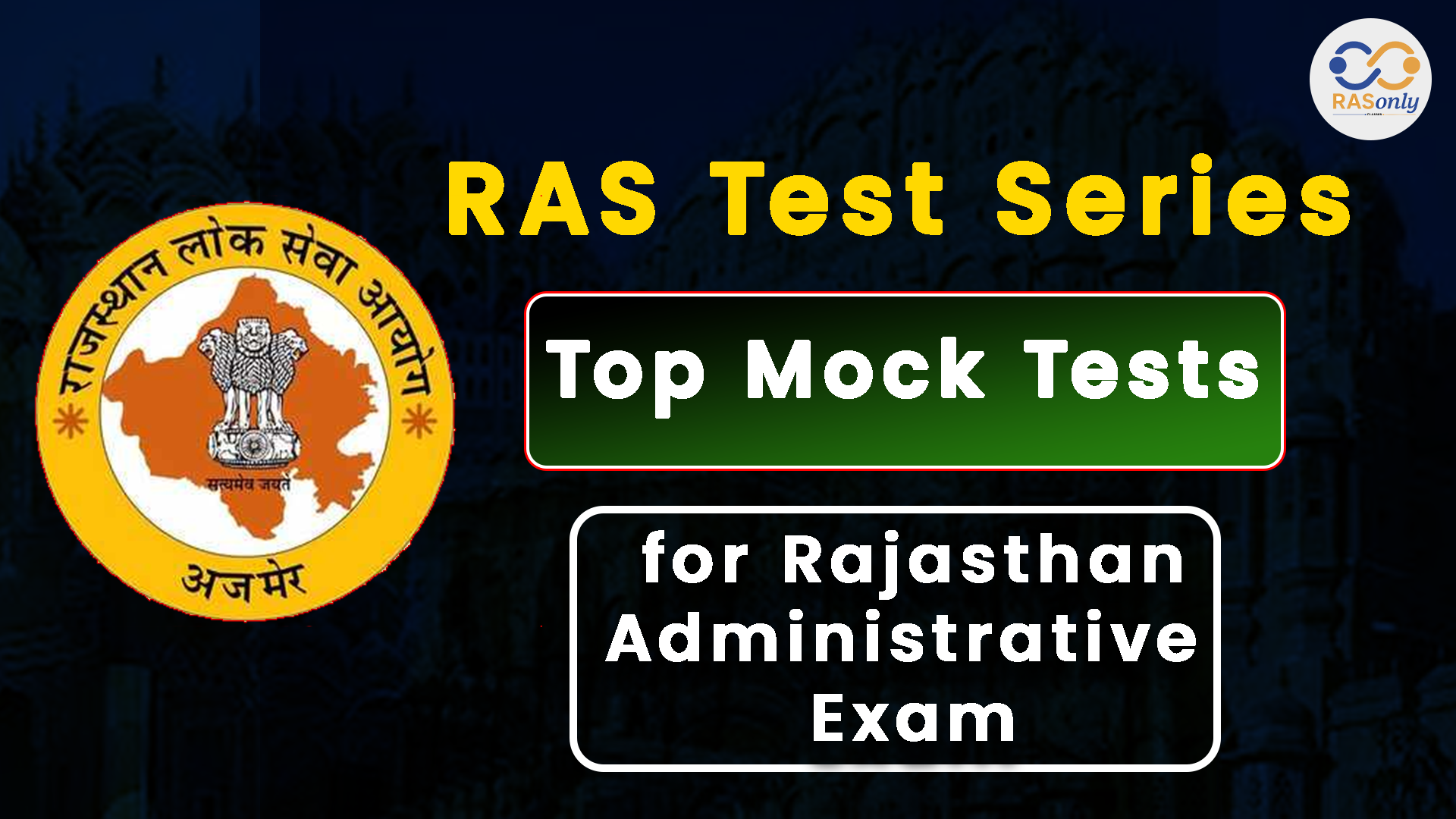RAS Mains Test Series | Download Test Paper PDFs
Practice Questions for RAS Mains - Check Paper-Wise Q&A


The RAS Mains exam demands both theoretical knowledge along continuous practice and skill refinement for answer-writing ability. Practice questions for RAS Mains are the most efficient method to reach exam readiness. The practice tests build your knowledge of exam structure and enhance your identification of weak areas while developing quick and accurate exam responses for the actual day. Your RAS Mains preparation will become efficient through paper-wise practice questions, which help you cover all subjects and topics effectively. The system strengthens both your confidence level and your capacity to deliver effective answers when faced with examinations.
Why Practice Questions Matter in RAS Mains Preparation?
The practice questions for RAS Mains transform abstract concepts into functional exam abilities. Consistent practice enables students to grasp the examination structure as well as improve their ability to manage time effectively and develop their response-writing capabilities. The following is a breakdown of why practice questions are essential for achieving RAS Mains success;
- Familiarity with Exam Pattern: You gain a better comprehension of which questions will appear and how the test will be organized.
- Time Management: The practice builds your capacity to handle test time effectively, which leads to finishing all questions within the allocated time.
- Identifies Knowledge Gaps: The practice test enables you to identify specific knowledge areas that require stronger focus.
- Improves Answer Writing Skills: The development of answer organization skills with precise and direct presentation methods happens through this step.
- Builds Confidence: Repetitive practice exercises increase your self-assurance as they help decrease test anxiety while strengthening your overall achievement.
RAS Mains Paper-Wise Practice Questions
Effective preparation for the RAS Mains examination requires students to structure their study process. The RAS Mains practice questions train candidates to build their ability to perform well in the examination. The features of the practice question include one paper at a time to handle an extensive syllabus by dedicating attention to individual subjects.
The RAS Mains exam consists of different subject tests, which require separate question-solving approaches because this strategy ensures precision in your preparation across all subjects. The following guide provides practice questions for RAS Mains across each paper to develop strong abilities in all essential areas.
RAS Mains GS Paper 1
RAS Mains GS Paper 1 addresses History, Geography, and Culture content while specializing in Rajasthan's history, together with its cultural heritage. This paper evaluates your knowledge of Indian historical events alongside Indian regional geography and major cultural developments. Solving Paper 1 practice questions for RAS Mains will improve your capacity to remember historical events while analyzing geographic patterns and understanding cultural influences across Rajasthan and India.
| Topic | Practice Questions |
|---|---|
| Indian History | 1. Discuss the impact of British rule on Indian agriculture. 2. Analyze the socio-religious reform movements in 19th-century India. 3. Examine the causes and consequences of the Revolt of 1857. |
| Indian Culture | 1. Explain the contribution of Buddhism to Indian culture and its spread across Asia. 2. Discuss the evolution of art and architecture during the Gupta period. 3. How did the Bhakti movement influence the social and cultural fabric of India? |
| Geography of India | 1. Analyze the impact of the monsoon on India’s agricultural economy. 2. Discuss the major factors responsible for the regional disparities in the development of India. 3. Examine the causes of desertification in Rajasthan and its impact on the environment. |
| Polity | 1. Discuss the major features of the Indian Constitution and its significance in the functioning of democracy. 2. Evaluate the role of the President in India’s political system. 3. How does the Indian federal system differ from the American federal system? Discuss with examples. |
| Modern History | 1. Analyze the role of Gandhiji in the Indian National Movement. 2. Examine the economic policies of the British in India during the 19th century. |
| World Geography | 1. Discuss the role of rivers in the development of human civilization and their impact on geography. 2. Explain the concept of 'Global Warming' and its implications on global climate patterns. |
RAS Mains GS Paper 2
GS Paper 2 of RAS Mains concentrates on examining India’s political system alongside its governance mechanisms and current social justice developments. The GS paper 2 practice questions for RAS Mains provide essential knowledge about India's constitutional structure alongside its political processes and welfare approaches to social justice. Your practice of RAS Mains questions from this paper will both strengthen your governance understanding and enhance your ability to analyze India's social and political framework.
| Topic | Practice Questions |
|---|---|
| Indian Constitution | 1. Explain the significance of the Fundamental Rights in the Indian Constitution and their relationship with Fundamental Duties. 2. Discuss the powers and functions of the Union Parliament. How do they balance the power of the executive? 3. How does the system of Judicial Review in India enhance the strength of the Constitution? |
| Polity and Governance | 1. Evaluate the role of the Election Commission of India in ensuring free and fair elections. 2. Discuss the functioning of the Parliamentary system in India and its impact on the governance model. 3. Analyze the relationship between the Union and State governments in India under the framework of cooperative federalism. |
| Social Justice | 1. How does the Indian government address the issues of poverty, unemployment, and inequality in its policies? 2. Examine the challenges to social justice in India in terms of caste, gender, and economic disparities. 3. Discuss the effectiveness of the various affirmative action policies in India. |
| Constitutional and Non-Constitutional Bodies | 1. Critically evaluate the role of the National Human Rights Commission (NHRC) in India. 2. Discuss the functions and powers of the Comptroller and Auditor General (CAG) in India. |
| Governance Reforms | 1. Examine the steps taken by the Indian government for police and judicial reforms. 2. How has the introduction of the Goods and Services Tax (GST) reformed the governance and economic framework of India? |
| International Relations | 1. Analyze India’s foreign policy towards its neighboring countries, focusing on the South Asian region. 2. Discuss India’s role in the United Nations, particularly its efforts for a permanent seat in the UN Security Council. 3. How does India’s relationship with the United States impact its foreign and security policies? |
RAS Mains GS Paper 3
The RAS Mains GS Paper 3 assesses candidates on Economy and Science-Tech knowledge alongside Environmental protection and Disaster response abilities. The examination measures your understanding of economic patterns combined with technological developments as they relate to government administration and national development. Your preparation with practice questions for RAS Mains enables you to maintain awareness of economic and environmental news. The practice questions for GS paper 3 will assist you in gaining competence to resolve examinations about national development and technical advancements.
| Topic | Practice Questions |
|---|---|
| Economic Development | 1. Analyze the role of agriculture in India’s economic development. How can it be made more sustainable? 2. Discuss the impact of Make in India on the manufacturing sector and job creation. 3. Evaluate the challenges of inclusive growth in India and suggest measures to address income inequality. |
| Technology | 1. Discuss the role of Information and Communication Technology (ICT) in enhancing governance and public service delivery. 2. Examine the impact of Artificial Intelligence (AI) and automation on India’s job market. 3. How can India leverage technological advancements to improve its healthcare sector? |
| Environment and Ecology | 1. Analyze the causes and impacts of deforestation in India and suggest measures to control it. 2. Discuss the role of renewable energy sources in India’s sustainable development goals. 3. How do environmental issues like air pollution and water scarcity impact India’s growth and development? |
| Bio-diversity | 1. Discuss the importance of preserving India’s biodiversity and the role of National Parks and Wildlife Sanctuaries. 2. Evaluate the significance of the conservation of the Western Ghats as a biodiversity hotspot. 3. Examine the role of the Convention on Biological Diversity (CBD) in India’s environmental policies. |
| Disaster Management | 1. Discuss India’s preparedness for natural disasters such as earthquakes, floods, and cyclones. What more needs to be done? 2. Evaluate the role of the National Disaster Management Authority (NDMA) in disaster preparedness and mitigation. 3. How can the use of technology be improved to manage and mitigate the impact of natural disasters in India? |
| Security | 1. Examine the security challenges posed by cyber threats in India and discuss measures to address them. 2. Discuss the role of internal security forces in India’s counter-terrorism efforts. 3. Evaluate the implications of border security and terrorism on India’s national security. |
RAS Mains GS Paper 4
RAS Mains GS Paper 4 measures your proficiency in General Hindi and General English as well as your ability to compose essays. The examination measures your language abilities along with your writing competencies and reading comprehension level. Evaluation of this paper tests your proficiency in delivering complicated messages while maintaining clear thought expression. Working with practice questions for RAS Mains helps you develop better language abilities while improving your literary craftsmanship, so you can produce well-organized and meaningful answers and essays in Hindi and English writing.
Practice Questions for RAS 2023
| Topic | Practice Questions |
|---|---|
| Ethics and Human Interface | 1. Discuss the concept of ethics in public administration. How can ethical decision-making contribute to effective governance? 2. Analyze the role of transparency and accountability in public office. Why are they essential for maintaining public trust? 3. Examine the ethical dilemmas faced by a civil servant when their values clash with professional duties. |
| Attitude and Aptitude | 1. How does attitude influence the behavior of a civil servant in their decision-making process? Provide examples. 2. Discuss the significance of emotional intelligence in leadership. How can it be developed in a civil servant? 3. What are the challenges and opportunities of balancing professional competence and personal integrity? |
| Integrity in Public Administration | 1. Discuss the importance of integrity in public service and its role in ensuring good governance. 2. How can the ethical culture within government institutions be promoted to ensure better public service delivery? 3. Examine the challenges in maintaining integrity in situations involving corruption and misconduct. |
| Probity in Governance | 1. What do you understand by "Probity in Governance"? Discuss its importance and how it impacts the governance system. 2. Analyze the role of the Right to Information (RTI) Act in promoting probity in governance. 3. Discuss the significance of a code of ethics for civil servants. How does it contribute to probity in governance? |
| Moral and Ethical Challenges | 1. A civil servant is asked to implement a policy that they disagree with. How should they approach this situation? 2. Discuss the moral and ethical challenges that civil servants face in situations of political pressure. 3. How can a civil servant deal with the ethical dilemma of balancing public interest with personal interest? |
| Role of Civil Servants in Upholding Ethical Standards | 1. What measures can be adopted by a civil servant to promote ethical practices within their department or organization? 2. Discuss the role of civil servants in ensuring fairness and justice in the implementation of government policies. 3. How should a civil servant respond to situations where they observe unethical practices in their workplace? |
Tips to Effectively Use These Practice Questions
Becoming successful with RAS Mains practice questions requires both a strategic framework and effective learning techniques to enhance preparation effectiveness. Questions need to be approached actively rather than passing them by to maximize learning and preparation for the exam. A step-by-step method follows for maximizing the value you get from practice questions;
- Time Yourself: Use practice questions to experience realistic examination timing by working through them across individual papers. Developing your speed and time management abilities results from this strategy.
- Self-Assessment: Directly following your completion of RAS Mains practice questions, review the answers you provided. Make note of the sections that require improvement regarding content detail, as well as framework and verbalization.
- Focus on Weak Areas: Your practice session results enable you to spot knowledge areas that need improvement. Devote additional time to reviewing concepts that you find challenging and work on mastering those specific areas.
- Revise Regularly: Spending time on practicing previous questions and answers should become a standard practice before moving on to new questions. The regular analysis of your responses results in better memory retention of the material that you learn.
- Seek Feedback: Obtain evaluations of your answer work whenever you can from friends and mentors who may guide your efforts. The feedback will assist you in developing better methods to present answers and improve your writing style.
- Break It Down: Devote your attention to completing one question from each test paper. The systematic approach protects both subject coverage and prevents you from attempting excessive papers simultaneously.
Conclusion
The practice questions for RAS Mains act as an essential tool for students to both shape their exam readiness and achieve proper preparation for this test. Your systematic approach to each paper lets you understand the syllabus better while improving your time organization and improving your capabilities to create answers. Regular practice allows you to build self-assurance while pinpointing subject matters that require improvement. Success in the RAS Mains exam requires a combination of prepared knowledge along with your ability to properly apply it during exam time. Regular practice with RAS Mains questions will lead you to your goal of joining Rajasthan's prestigious administrative services.
FAQs
Post Category
- RAS Salary
- Result
- RAS Admit Card: Latest Updates and Blogs
- RAS Job
- RAS Cutoff
- Preparation Tips
- RAS Answer Key
- RAS Exam Analysis
- RAS Syllabus
- RAS Previous Year Papers
- RPSC RAS Exam Pattern
- RAS Interview
- RAS Mains Exam Date: Schedule and Updates
- RAS Vacancy
- RAS Test Series
- RAS Best Books
- RAS Preparation Resources
RASOnly Interview Guidance Program

Mr. Ashok Jain
Ex-Chief Secretary Govt of Rajasthan
- IAS officer of the 1981 batch, Rajasthan cadre.
- Passionate about mentoring the next generation of RAS officers with real-world insights.
- Got retired in Dec 2017 from the post of Chief Secretary of the state of Rajasthan.

Mr. Guru Charan Rai
Ex-ASP / SP in Jaisalmer
- Guru Charan Rai, IPS (Retd), retired as Inspector General of Police (Security), Rajasthan, Jaipur in 2017.
- Served as ASP and SP in Jaisalmer, Nagaur, Sri Ganganagar, Sawai Madhopur, Dausa, Sikar, and Karauli.
- He also held key positions as DIGP and IGP in the Law and Order division.

Mr. Rakesh Verma
Ex-IAS Officer, B.Tech, MBA, and M.A. (Economics)
- IAS officer of the 1981 batch and retired in Chief Secretary Rank.
- Civil servant of high repute and vast experience.
- Has been teaching UPSC CSE subjects for the last six years.


